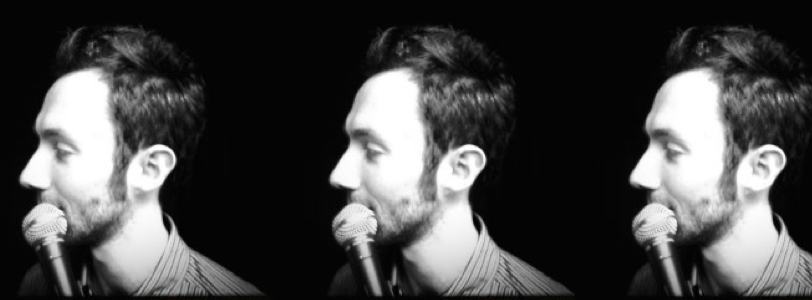Could you first introduce yourself to the reader?
Hi, it's David Ephgrave here: an actor, musician, comedian, blogger - and above all, pauper - who's about to enter my fifth Edinburgh Fringe and second as a solo performer, with my new show 'Now Who's a Comedian?' at Just the Tonic at The Caves every midday (he said in one breath).
How would you describe your show?
I essentially bring my daily blog to life in it (which I've been writing for four years, man and boy) using my projector, screen and MacBook as a metaphorical magician's assistant, helping drag the audience into my awkward, petty little world, with pictures, videos and the occasional ten-second song to cleanse the palate; that wasn't meant to come out as pretentious as that.
Why do you want to perform at Edinburgh Festival Fringe?
There's no other festival like it. For a month, you're surrounded by talent: thousands of people performing for the joy and expression of it. It's gruelling, depressing and sometimes terrifying, but at its best, truly inspiring. It's also a chance to test your lower back with a month of climbing hills that appear out of nowhere with no logical sense.
What differentiates it from other festivals?
First off, it's the size of it. It was the first of its sort and it's grown year on year - and if you're a comic, it's your unofficial trade fair; for a month you become a walking advert for yourself. This can bring out the best and worst in humanity, but if you approach it gently and keep things in perspective, you find a way to enjoy it without becoming an egotistical git.
Do you think the Fringe has changed over the years? If so, how? Are these changes positive or negative?
The worst change is the cost. I came up for the first time with my double act partner Glyn Doggett in 2008 with a comedy play we'd written, and we still owe our families a sizeable percentage of the money they lent to fund it nearly a decade later. Like much of the performing arts industry, there are too many people on the business side that are motivated purely by profit, leaching off performers who'll pay over the odds because they're desperate to do it. Things are improving, thanks to the rise of the Free Fringe and venues like Just the Tonic that don't charge you an arm and a leg; like my dad always says, "Never settle an invoice with body parts".
What first motivated you to enter the industry? Who were your inspirations?
I wanted to perform for as long as I can remember, as clichéd as that sounds. I was obsessed with magic as a kid, thanks to the Paul Daniels Magic Show and the Paul Daniels magic set. Then I wanted to be a singer and bassist; immersing myself in The Beatles and Paul McCartney's back catalogue from an early age. I was lucky enough to get the chance to tell both Macca and Daniels in person how much they'd inspired me; I just like people called Paul, all right?
If you didn't have your current job, what would you probably be doing?
I nearly ended up junior manager of Argos in Letchworth, before dropping it for drama school at the last minute. Retail's loss was theatre's gain.
If you could have any job in the world, what would it be?
I'm resisting the temptation to quote Derek and Clive. I would have loved to have been in Hancock's Half Hour, which is sadly an impossibility without a time machine (or me being cast in the brilliant Radio Four series The Missing Hancocks; Neil Pearson, are you listening?)
What is your earliest childhood art memory?
Seeing Floella Benjamin and the pantomime dame Paul Laidlaw in Aladdin at the Gordon Craig Theatre in 1986. I was only five, but was suckered in by the magic of it. I wanted to fly on a wire like Floella and disappear down a trapdoor like Abanazar. I loved the anarchy Laidlaw brought to it; however scripted he may really have been, it excited me that he appeared to make it up as he went along; suddenly, becoming a comic makes perfect sense.
Do you ever feel any pressure to be a social commentator, or constantly update material to respond to events?
It depends on the type of show you present. I'm very politically motivated and left-leaning, but that tends to come to the forefront more in my blog and on Twitter than in my stand-up, particularly in the context of Edinburgh. If something big happens, I'll always acknowledge it, but I'll leave more detailed social commentary stand-up to the likes of the excellent Stewart Lee and Ashley Haden for the moment.
Equally, do you think there has been a shift in public sentiment that has affected your work?
Definitely. A few weeks ago, I received a tweet from someone who'd seen a gig I did with Norman Lovett and enjoyed it. They said, "The world needs to laugh more these days than ever"; I think they're right.
Describe the last year in 5 words or less?
Tiny-handed billionaire inherits button; I've just depressed myself.
If you could work with anybody, from any point in history, who would you pick and why?
Tony Hancock in Hancock's Half Hour in the Fifties or Rowan Atkinson at the height of Blackadder in the late Eighties. I never cease to be inspired by the faultlessness of their comic performances; every word is delivered spot-on.
Why would a performer opt to do either a ticketed event or participate in the free fringe? What are the benefits and limitations of both?
People tend to be drawn to the Free Fringe by a mix of ethics and cost. I've done my fair share of free shows, both on my own and with Doggett & Ephgrave, and I'm bound to do more - but on balance, I prefer if they're a ticketed event, as something about a financial transaction, however small, suggests commitment; I still remember the time someone I flyered for a show told me it couldn't be good if it was free; I don't think he was prepared for the spleen I vented.
What advice would you give to someone who wants to take a show up to the fringe?
Don't go into it with any expectation other than the chance to hone what you do through the luxury of gigging daily. Keep a sense of perspective and be mindful of your mental health. Don't take yourself too seriously as you'll end up looking like a dick.
When and where can people see your show?
I'm at Just Out the Box in Just the Tonic at The Caves from the 3rd to the 27th at midday, except for the 14th. That day, I'll be prostrate in a darkened room.
And where can people find, follow and like you online?
You can check out my daily blog at www.mostlydavidephgrave.blogspot.co.uk, follow me on Twitter at @david_ephgrave or like me on Facebook at www.facebook.com/TheDavidEphgrave. Don't follow me home though, as there's a limit.
David Ephgrave: Now Who's a Comedian? is performing at Just the Tonic at The Caves at 12:00 on 3rd - 27th (not 14th). For tickets and more information visit the Ed Fringe website.









0 Comments